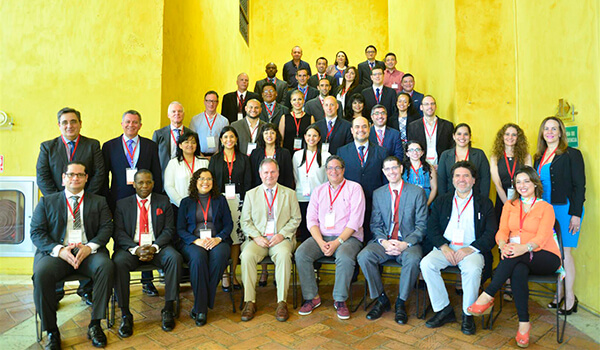A little history, friendship and international taxation in Cartagena de Indias

Ever since it was established over 50 years ago, CIAT has been supporting the needs, concerns and progress of its member countries in the sphere of international taxation. Just to mention a few examples, in the 80’s, the first regional model for the exchange of information for tax purposes was developed and promoted in the 80’s and subsequently updated in 1999. The Manual on the Implementation of Information Exchange was published in 2006. It was followed by the publication in 2007 of the Manual on International Tax Planning Control. More recently, in 2013, the 47th CIAT General Assembly was held in Argentina and its main theme was “International taxation aspects that affect the management of tax administrations”. At said General Assembly, there arose a declaration, which expressed the interest of the CIAT member countries in aspects dealing with international taxation.
Starting in 2010, the CIAT member countries began requesting additional support on said subject matter. In response, the CIAT Executive Secretariat has been gradually increasing its level of activity in this area. It has thus coordinated 17 technical exchanges between tax administrations, provided 94 weeks of technical assistance, undertaken 7 sensitivity awareness actions and over 20 events on the subject. During this same period, 7 technical documents have been produced, an initiative on the availability of public information of interest for tax control has been promoted and assistance has also been provided in 23 technical consultations on international taxation issues.
In the training area, CIAT has conducted at a distance courses on transfer pricing and information exchange, in addition to a Master’s Program in International Taxation, Foreign Trade and Customs offered jointly with Universidad Externado de Colombia. These programs allow for training hundreds of students every year, especially tax administration officials.
It is thus evident that international taxation has been acquiring specific importance in the countries’ agendas. These may be so for varied reasons. On the one hand, it is a political priority based on international commitments (e.g.: implementation of actions of the BEPS Inclusive Framework). On the other, it is deemed necessary to restrain harmful international tax planning and thus protect tax resources.
Prior to the existence of the BEPS Action Plan, in general terms, the countries of the regions focused their efforts on the control of transfer pricing. Through common tendency, all the Latin American and some Caribbean countries have rules for controlling transfer pricing, with this issue being the one that has generated most discussions and demanded more efforts in the region. Likewise, other international matters were considered. I wonder whether at present, the specific weight of this matter is greater or lesser than that of other issues posed in the BEPS Action Plan. It would be necessary to count on more and better data, risk systems and statistics to determine which risks in international taxation are more harmful for the Latin American and Caribbean countries.
On the other hand, the region has faced difficulties in harmonizing its tax systems. In particular, when we talk about international taxation, harmonization has been “imported”. In this case, I am referring to solutions that have not originated in the region, but rather come from different contexts. This is neither good or bad, if we consider that BEPS is an opportunity for everyone. Nevertheless, what is reprehensible is the difficulty for applying some measures and/or the lack of harmonization in those purely regional aspects, which for some reason have been left out of BEPS.
Seen from another perspective, the region has not resorted either to orderly coordination mechanisms to harmonize its action during the process of formulation and discussion of the results of BEPS actions. I consider this “key” in order that Latin America and the Caribbean may act consistently in international forums and clearly represent their interests. Herein, regional organizations, in coordination with the international ones, may contribute value, since they have the capacity for acting as facilitators of the necessary dialogue to better understand the risks in the regional context and, accordingly, promote consensus for arriving at harmonized solutions.
This latter situation motivated CIAT to renew the face-to-face meetings of the International Taxation Network. Thus, with the financial support of the GIZ and the Interconecta Cooperation Program of Spain, the CIAT International Taxation Network meeting was held at the Spanish Cooperation Training Center in the city of Cartagena de Indias (Colombia) on July 4 to 7, 2017. Participants in the Network meeting included representatives from 23 Latin American and Caribbean countries, Spain, OECD, World Bank, UN, GIZ of Germany, LATINDADD, Externado de Colombia University, the University of Castilla de La Mancha of Spain and the University of Maastricht of The Netherlands.
The significant participation of relevant regional and international actors resulted in high level discussions regarding the important achievements in international taxation at the international level, the work of international and nongovernmental organizations as well as the academic sector, in addition to the performance of the tax administrations in relation to real cases of harmful tax planning that have been identified.
In my opinion, the first meeting of the International Taxation Network has resulted in:
Finally, what can most importantly be generated within a Network is the trust and friendship of its members, which is always necessary for arriving at an atmosphere of comradeship and cooperation.
All this was only possible through the bonds maintained by the CIAT Executive Secretariat with its member countries, GIZ of Germany, Swiss Cooperation –SECO-, IDB, European Commission –EUROsociAL Program-, ITC, Spanish Cooperation, United Nations, OECD, World Bank, TJN, LATINDADD, IBFD and the academic world.
In sum, all these outcomes have been, are and will continue to be the result of the work of networks.
1,417 total views, 3 views today
